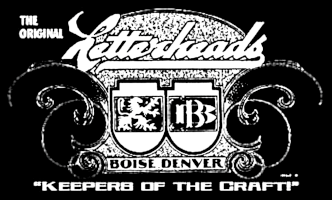I just read an article about John Downer repainting an old glass facia.
http://www.typedu.org/dynamic/blog/signpainter
In this article he descripes how to properly clean an old glass piece before applying new paint:
- Once with mineral spirits
- Once with Bon Ami and water
- Once with ammonia & baking soda
- Once with vinegar & baking soda
- Once with pure water alone
My question is: "Does anybody know why baking soda is used?".
Welcome to The Hand Lettering Forum!
This is an interactive Bulletin Board on the topics of Sign making, design, fabrication, History, old Books and of coarse Letterheads, Keepers of the craft. The Hand Lettering Forum features links to resources, sign art history, techniques, and artists profiles. Learn more about Letterheads at https://theletterheads.com. Below you'll see Mchat has been added as a live communication portal for trial, and the Main forum Links are listed below.
This is an interactive Bulletin Board on the topics of Sign making, design, fabrication, History, old Books and of coarse Letterheads, Keepers of the craft. The Hand Lettering Forum features links to resources, sign art history, techniques, and artists profiles. Learn more about Letterheads at https://theletterheads.com. Below you'll see Mchat has been added as a live communication portal for trial, and the Main forum Links are listed below.
Baking Soda
Moderators: Ron Percell, Mike Jackson, Danny Baronian
-
erik winkler
- Posts: 1097
- Joined: Sat Feb 23, 2008 5:48 pm
- Location: Amsterdam Netherlands
- Contact:
Baking Soda
Last edited by erik winkler on Sat Jun 07, 2008 3:46 pm, edited 1 time in total.
Realizing we are in the 2nd renaissance of the arts.
Learn, copy and trying to improve...
Still in the learning phase
Amsterdam Netherlands
www.ferrywinkler.nl
www.schitterend.eu
www.facebook.com/Schitterend.eu
Learn, copy and trying to improve...
Still in the learning phase
Amsterdam Netherlands
www.ferrywinkler.nl
www.schitterend.eu
www.facebook.com/Schitterend.eu
-
Kelly Thorson
- Posts: 502
- Joined: Tue Apr 20, 2004 11:53 pm
- Location: Penzance, SK Canada
- Contact:
Hi Erik,
I've been enjoying your posts. It's always nice to have some fresh perspective here. I like curious people.
Baking soda has been used as a household cleaner for many years. It is mildly alkaline and works as a neutralizer for both bases and acids. Because of this it neutralizes the odors caused by them. In the case of cleaning glass I think it has to do with both the alkaline ability to break down fats as well as the mild abrasive quality of the granules. It's hard enough to damage copper and aluminum (in addition it may cause tarnishing of aluminum by attacking the protective surface) but won't scratch glass. In addition it may help to neutralize chemicals left from other cleaners.
I've been enjoying your posts. It's always nice to have some fresh perspective here. I like curious people.
Baking soda has been used as a household cleaner for many years. It is mildly alkaline and works as a neutralizer for both bases and acids. Because of this it neutralizes the odors caused by them. In the case of cleaning glass I think it has to do with both the alkaline ability to break down fats as well as the mild abrasive quality of the granules. It's hard enough to damage copper and aluminum (in addition it may cause tarnishing of aluminum by attacking the protective surface) but won't scratch glass. In addition it may help to neutralize chemicals left from other cleaners.
I believe there is no shame in failure. Rather, the shame lies in the loss of all the things that might have been, but for the fear of failure.
-
erik winkler
- Posts: 1097
- Joined: Sat Feb 23, 2008 5:48 pm
- Location: Amsterdam Netherlands
- Contact:
Thanks Kelly,
So i could compare it a little with Bon Ami.
It neutralizes the ammonia and vinegar, gets rid of fat/oil and also works as an abrasive.
Erik
So i could compare it a little with Bon Ami.
It neutralizes the ammonia and vinegar, gets rid of fat/oil and also works as an abrasive.
Erik
Realizing we are in the 2nd renaissance of the arts.
Learn, copy and trying to improve...
Still in the learning phase
Amsterdam Netherlands
www.ferrywinkler.nl
www.schitterend.eu
www.facebook.com/Schitterend.eu
Learn, copy and trying to improve...
Still in the learning phase
Amsterdam Netherlands
www.ferrywinkler.nl
www.schitterend.eu
www.facebook.com/Schitterend.eu
 Denver Chapter of the Letterheads
Denver Chapter of the Letterheads